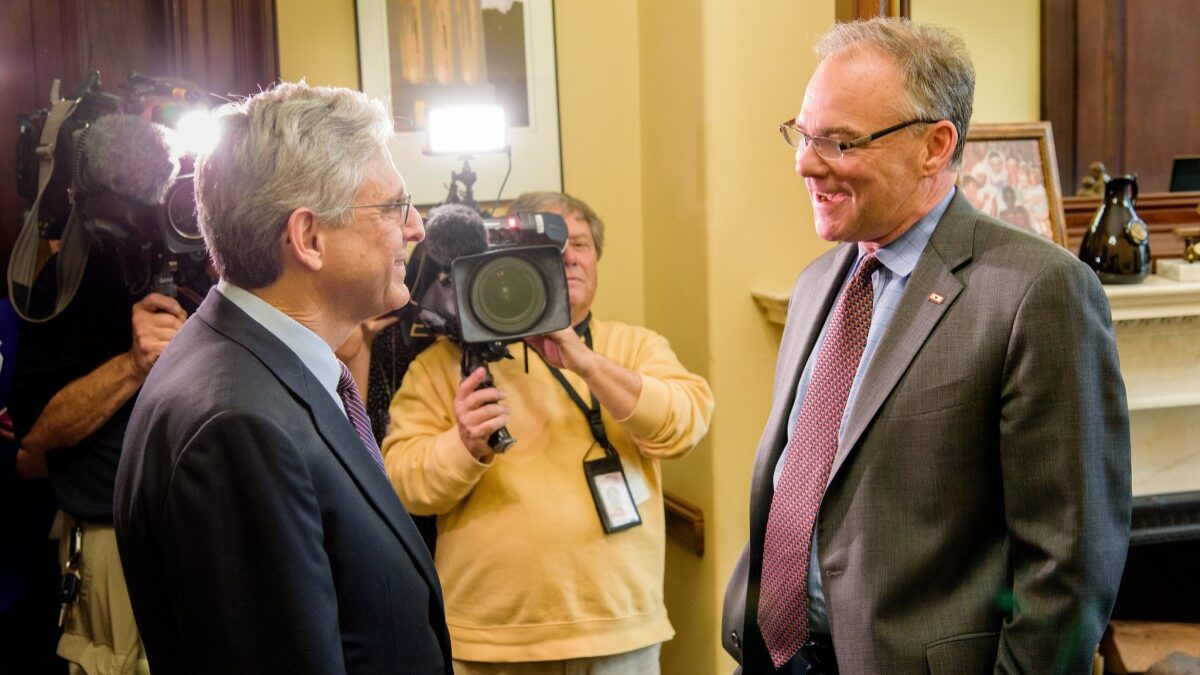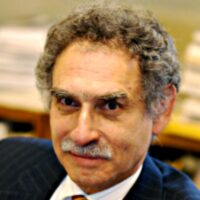You don’t need a lawyer. A truck driver can tell the difference between the crowd that welcomes the Red Sox home after they’ve won the World Series and the sullen crowds still standing outside the homes of the conservative justices of the Supreme Court.
We all know the difference between a smile and frown, between waving hands gesturing people to come forward versus hands signaling people to stay away. The differences are grounded in the natural way people understand body language, and in the way they understand words as their meanings are settled in ordinary language.
Not only does everyone understand these things, they must in order to get on with daily life. Everyone understands these human basics — that is, unless he is Attorney General Merrick Garland and the young lawyers in the Department of Justice feeding him advice.
When he was asked at a congressional hearing about the unfriendly crowds gathered every day around the homes of Justices Samuel Alito and Brett Kavanaugh, the attorney general said the discretion to deal with the crowds rested with the Marshals’ Service, on the scene to protect the judges.
Michael Mukasey, the distinguished judge who became attorney general under George W. Bush, remarked in a public speech that this account of Garland’s was a transparent evasion: The Marshals’ Service, as he well knows, is under the governance of the attorney general. The responsibility for any willingness to leave conservative justices with hostile groups planted outside their doors rests with Garland.
Under federal law, it is a crime to picket or parade “in or near” a federal judge’s residence “with the intent of influencing” him “in the discharge of his duty.” Yet it has been reported that the deputies serving at the justices’ homes have been told to enforce the law only as “a last resort to prevent physical harm to the Justices and/or their families.” Putting out sentences of that kind reflects a public discourse on law so shopworn that real principles have been turned into cliches, fit neither for prime time nor fortune cookies.
Verbal Assaults and Threats
The first point of awareness is that the notion of an “assault” has never depended upon bodily touching. One could shoot at a person and deliberately miss, or hold an unloaded gun near his head and pull the trigger. That is why “verbal assaults” were always taken seriously, as real assaults: the threatening or terrorizing phone call in the middle of the night, the campaign of denigration against racial and religious groups that have produced riots in the past, or the defamation that destroys a man’s reputation and business.
So Judge Kyle Duncan, while visiting the Stanford law school, made his way to the room for a recent lecture by passing through files of students spitting out derision and contempt for him. Furman University prepared to receive the writer Mary Eberstadt as students scrawled “fascist” on pictures of her, and the drumbeat went on calling her a “vicious transphobe” and “homophobe” — a routine welcome for conservative speakers.
The administrators of both places were either shameless or witless enough to say that all of this is quite compatible with institutions preserving a climate of tolerance and respect for freedom of speech on the campus. Have they really so beclouded their minds?
Mob Protests Undo the Rule of Law
Even a strongly liberal Supreme Court in 1965 was utterly adamant there could be no tenable freedom to hold a demonstration outside a courthouse (Cox v. Louisiana). That kind of display had the danger of fostering the impression that a verdict inside that courthouse might be affected by the massing of people in the street.
Justice Arthur Goldberg wrote that it was necessary to dispel the impression that “the judge’s action was in part a product of intimidation and did not flow only from the fair and orderly working of the judicial process.” If so much could be said for protecting the integrity of the judicial branch, why is it not just as important to protect the integrity of the legislative and executive branches?
Of course, the same thing may be said of any massive demonstration on the street. There is no presentation of reasons or arguments. It is a kinetic show, suggesting that the people in the street should have their way because they have the strength of numbers.
Thomas Hobbes, the famous British philosopher of the 17th century, was no friend to liberal democracy, yet with his steely eye he saw to the core of this problem: “It may be lawful for a thousand men to join a petition to be delivered to a judge, or magistrate; yet if a thousand men come to present it, it is a tumultuous assembly; because there needs but one or two for that purpose. … [A]n assembly, whereof men can give no just account, [is] a sedition….”
Even Progressive Judges Agree
No judge was more of an “absolutist” on free speech than Hugo Black, President Franklin Delano Roosevelt’s first appointee. Even though he held back from joining the Supreme Court’s opinion in Cox v. Louisiana, the case moved him to this remarkable statement of his “absolutist” position: “The First and Fourteenth Amendments take away from the government, state and federal, all power to restrict freedom of speech, press, and assembly where people have a right to be for such purposes [italics added].”
One place they did not have the right to be, thought Justice Black, was outside the home of Mayor Richard J. Daley, the legendary mayor of Chicago. Black did not entirely agree with the way the police cleared away demonstrators in front of Daley’s home, but he couldn’t believe that government lacked the authority to protect public officials in their homes, “the sacred retreat to which families repair for their privacy and their daily way of living”:
Men and women who hold public office would be compelled, simply because they did hold public office, to lose the comforts and privacy of an unpicketed home. … Speech and press are, of course, to be free, so that public matters can be discussed with impunity. But picketing and demonstrating can be regulated like other conduct of men. I believe that the homes of men, sometimes the last citadel of the tired, the weary, and the sick, can be protected by government from noisy, marching, tramping, threatening picketers and demonstrators bent on filling the minds of men, women, and children with fears of the unknown.
That brings us back to the homes of Supreme Court justices. The fact that the crowd does not engage in violent acts is not enough to dissolve the threatening meaning of their presence.
No Equality Before the Law for Democrats’ Enemies
Years ago I suggested a scene in which a hostile crowd assembled all night outside the home of a black family newly moved into the neighborhood. They could engage in mockery by singing black spirituals, or they could preserve a glowering, stony silence.
A notable Chicago lawyer, Maynard Wishner, told me he had seen such a scene take place. The crowd assembled across the street from the black family, on the lawn attached to the house of a white family.
This drew the attention of Tim O’Connor, the police commissioner. O’Connor confronted the owner of the house and asked him what this was about. The owner said the people were his guests. In that case, said O’Conner, get them into the house or the yard behind the house. As for others, he said, clear away from the scene or “get into the [police] wagon.”
It does not take a degree in comparative literature to decode and understand that scene. Can it really be that the graduates of the best law schools have been tutored now in theories that cloud their eyes to things that ordinary men, with common sense, have no trouble seeing?
The lawyers of Garland’s department suffer no embarrassment over the fact that conservative justices may now be virtually constrained from a public life outside their homes. Those justices cannot go to restaurants without the protection of federal marshals. Justice Alito notes he cannot go fishing without a marshal in a boat nearby.
The lawyers of the Democratic Party are clear enough on what they are doing: They are withdrawing the protections of the law from conservatives as a not-so-gentle way of marking them unfit for company and their jurisprudence odious. And Americans are regarded as hyperbolic, a bit over the edge, when they venture the thought that we may be in the first, lawfare stage of a civil war.









